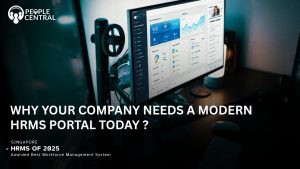In the vibrant metropolitan area of Singapore, a booming city-state with gleaming edifices loftier than the average and innovation constantly taking place, many businesses look for ways to get a leg-up in a competitive marketplace. Many different elements contribute to the success of a company, but the role of Human Resources (HR) in contributing to the growth of a business is one that is least considered. Implementing an intentional HR strategy may be the secret ingredient that takes a company from successful to exceptional, particularly in Singapore’s dynamic business environment.
HR Strategy For Business Growth: The Tech-Driven World
Now, with advancements in artificial intelligence and automation surfacing almost everywhere, the argument by now sounds hallucinatory- focus on human capital, but it is the human element that can give an edge to a company in a range of possible jurisdictions ahead of AI. Smart HR practitioners realize that although state-of-the-art technology can smoothly speed up complicated procedures and smooth out factual labor, it is still people who define concepts, articulate creed, nurture relationships, and make major decisions about the best organizational model.
HR Strategy For Business Growth: Core Aspects
Growth Mindset
Growth mindset among employees has to become the bottom line of the effective HR strategy for business growth. The term was coined by psychologist Carol Dweck, popularizing that individuals who believe that their talents can be developed through hard work, good strategies, and input from others would achieve more than people who do not possess such a growth mindset.
Such a way of thinking should be instilled into the high-pace business environment of Singapore and HR must lead the way through:
- Continuous learning programs
- Prudent risk-taking
- Recognition and rewards based on effort and progress, not output
The points mentioned will make HR crucial in terms of incorporating responsive and resilient resources ever prepared to embrace new challenges and activities at all times – qualifiers in business growth.
Also Read:- Singapore Public Holiday 2024 Guide: Maximize Your Holiday Plans
Matching HR Strategy To Business Objectives
Perhaps the most critical ingredient of a well-crafted HR strategy is the extent to which it is aligned with overall business goals. Confronted by an ever-changing Singapore business climate, alignment is now more important than ever before. HR leaders have got to sit at that table when it comes to strategic planning. People’s strategies then follow and drive business goals.
This includes:
-Workforce planning in accordance with expansion into new markets.
-Leadership pipelines to support succession planning; compensation-structures designed to reinforce desired behaviors.
Employee Engagement
The growth of business is driven by engaged employees. Engaged employees are more productive, innovative, and less likely to leave the company. Employee engagement is critical in Singapore due to the high competition for jobs and the existence of active job hopping.
Best HR practices that support engagement include the following:
-Regular reminders and feedback,
-Development opportunities and Work-life balance
-Recognition practices that reflect Singaporean values and culture.
Engagement creates an environment whereby the employee is valued, empowered, and engaged in the purpose of helping their company succeed.
Leveraging Data
In the information age, HR strategies should be based on data as long as it is rooted based on analytics. With its emphasis on technology and innovation, Singapore is already leading the pack in this trend. HR can use data to:
– Identify skills gaps and training needs
– Predict and pre-empt employee turnover
– Assess the efficacy of HR initiatives on business outcomes
HR can use data to inform its decision making and ultimately show how HR contributes directly to the growth of the business.
Also Read:- Rights & Entitlements About Medical Leave Singapore 2024
Harboring Talent
Singapore faces a highly competitive labor market, and unemployment rates remain remarkably low. Therefore, the acquisition of talent is both challenging and crucial. Strategic HR practice in talent acquisition is more than just filling gaps. It includes:
– Employer branding: Creating a compelling story on why your company is a preferred employer in Singapore.
-Skills-based hiring: Move beyond traditional qualifications to find the right fit in terms of skills and potential within candidates.
-Diversity and inclusion: Singapore’s multicultural workforce with diverse perspectives and ideas.
Note: For more informative insights on HR strategies in the Singaporean context, check out the Ministry of Manpower’s resource on progressive workplace practices.
The Future Track
As we look into the future, it would surely seem that the companies that will succeed in such competitive landscapes in Singapore are those who place their people first. For technology keeps changing the game in this world, it is the human element that would push sustainable growth in business.
Building a growth mind-set, strategic talent acquisition, employee engagement, data-driven decision making, and alignment with business goals will ensure HR as a forceful driver for growth. Lee Kuan Yew- Singapore’s founding father once said: “If you deprive yourself of outsourcing and your competitors do not, you’re putting yourself out of business.” The same can be said for depriving the business from a strategic HR function.








 5
5


























